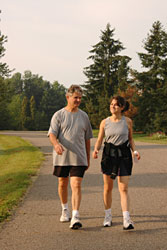More Health and Nutrition Bites
Related
How to Exercise with Disabled or Weak Legs
Spending long hours sitting in a wheelchair or in a bed can not only be uncomfortable, but can also lead to weight gain, weakened muscles, joint and muscle stiffness and weakened heart and lungs. Thus, moving as much as possible is very important for anyone with disabled or weak legs. This is easier said than done, because quite a few exercises, particularly aerobic exercises, involve the use of functioning legs.
Exercise Improves Eating Habits
Yes, the biology of caloric management is not fully understood; however, researchers are beginning to show that exercise does have an effect on eating, and their results are encouraging.
Weight, Lean Body Mass and Exercise
You have finally made a commitment to regularly exercise, build up strength and tone your muscles. You step on the scale a few weeks later to find that you have not lost or maybe even gained weight! You figure that something is wrong with the scale, because your pants are too big and you look and feel thinner. Chances are that your scale works just fine.
Health & Nutrition Bites
Get the latest health and diet news - along with what you can do about it - sent to your Inbox once a week. Get Dr. Gourmet's Health and Nutrition Bites sent to you via email. Sign up now!
How Much Exercise Are Your Kids Getting, Really?
It's important for kids to develop healthy eating and exercise habits so that those habits persist into adulthood. Yet more and more children are becoming overweight and obese, which can cause diabetes, heart disease, high blood pressure and other chronic conditions long before they stop needing a pediatrician.
There have been lots of programs aimed at getting children to be more active, but they haven't been all that effective. Researchers in the United Kingdom theorized that one of the reasons those programs might not be working might be that children (and their parents) believe that they are already active enough. This might also be complicated by the feeling that exercise is only necessary if you need to lose weight.
 So is there a difference between a parent's perception of their child's
activity level and how much activity the child actually gets? To
find out, a team of scientists recruited 1863 children and 1,757
of their parents to participate in a week-long study of the children's
activity level (Am J Prev Med 2010; 38(1):1-8). The children were
fitted with accelerometers to measure their level of activity and were
instructed to wear it at all times while awake, except for bathing or swimming.
Height and weight were measured for both children and parents, and a food
diary kept for the child.
So is there a difference between a parent's perception of their child's
activity level and how much activity the child actually gets? To
find out, a team of scientists recruited 1863 children and 1,757
of their parents to participate in a week-long study of the children's
activity level (Am J Prev Med 2010; 38(1):1-8). The children were
fitted with accelerometers to measure their level of activity and were
instructed to wear it at all times while awake, except for bathing or swimming.
Height and weight were measured for both children and parents, and a food
diary kept for the child.
Both parents and children were independently asked to assess their level of activity: parents were asked whether their child was "very inactive, fairly inactive, neither inactive or active, fairly active or very active" while the child assessed herself in comparison to other children: "would you say that you were much more active, more active, about average, less active or much less active"?
Interestingly, over half of the children were able to accurately assess their physical activity level, while almost 70% of parents' perceptions of their child's activity was accurate. This is the good news. The bad news is that of those 30% of parents whose perceptions of their child's activity were not accurate, 80% overestimated how much activity their children got. That works out to almost 25% of all parents overestimating their child's physical activity.
Overall, almost 1 in 3 children were not meeting the recommended guidelines of 60 minutes per day of moderate or vigorous physical activity, even though 80% of their parents thought they were "fairly active." Those children whose parents overestimated their activity level tended to be girls and tended to be those children who were not overweight.
What this means for you
Is your child really getting an hour a day of physical activity? Don't assume that just because they have a physical education class at school that they're getting enough exercise, nor should you assume that just because they're normal weight that they don't need to exercise. Exercise is critical for those of all ages to protect heart health and to help prevent conditions like osteoporosis and even Alzheimer's Disease. Make walking, cycling or just playing kickball together a part of your family life.
First posted: February 10, 2010
